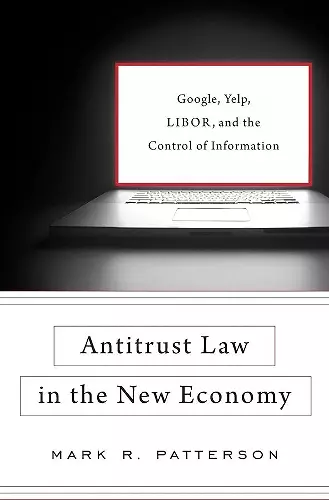Antitrust Law in the New Economy
Google, Yelp, LIBOR, and the Control of Information
Format:Hardback
Publisher:Harvard University Press
Published:23rd Feb '17
Currently unavailable, and unfortunately no date known when it will be back

Markets run on information. Buyers make decisions by relying on their knowledge of the products available, and sellers decide what to produce based on their understanding of what buyers want. But the distribution of market information has changed, as consumers increasingly turn to sources that act as intermediaries for information—companies like Yelp and Google. Antitrust Law in the New Economy considers a wide range of problems that arise around one aspect of information in the marketplace: its quality.
Sellers now have the ability and motivation to distort the truth about their products when they make data available to intermediaries. And intermediaries, in turn, have their own incentives to skew the facts they provide to buyers, both to benefit advertisers and to gain advantages over their competition. Consumer protection law is poorly suited for these problems in the information economy. Antitrust law, designed to regulate powerful firms and prevent collusion among producers, is a better choice. But the current application of antitrust law pays little attention to information quality.
Mark Patterson discusses a range of ways in which data can be manipulated for competitive advantage and exploitation of consumers (as happened in the LIBOR scandal), and he considers novel issues like “confusopoly” and sellers’ use of consumers’ personal information in direct selling. Antitrust law can and should be adapted for the information economy, Patterson argues, and he shows how courts can apply antitrust to address today’s problems.
Professor Patterson offers a comprehensive and insightful analysis based on the proposition that antitrust law should take seriously information as a product in itself. Antitrust Law in the New Economy will inform and generate debate about the important issues concerning competition in today's information economy. The book's argument that antitrust law should limit the freedom of dominant information providers to design and use their products to gain competitive advantages makes it required reading for Silicon Valley entrepreneurs and regulators around the world. -- Barry Hawk, Fordham University School of Law
A fascinating and truly innovative book that offers a much-needed, fresh view of information markets. Proposing a new (and broad) understanding of information power as market power, Mark Patterson cuts through the sometimes pointillistic discussions of the new digital challenges in the established boxes of false advertising and consumer protection law and offers new solutions to a wide range of difficult issues under the regime of antitrust law. Controversial issues like manipulated search results, ratings, misleading information on comparison sites, or the deliberate maintenance of uncertainty on the validity of patents suddenly appear in a new light. While testing the limits of antitrust law, this book will significantly advance the debate on the right legal framework for digital markets—both in Europe and in the United States. -- Heike Schweitzer, Free University of Berlin
Patterson’s book does a very good job—perhaps the best I have seen—on how the information economy is shaped by dominant information providers such as Google, Facebook, and others. -- Jennifer A. Manner * Georgetown Law Technology Review *
Smart, useful…If you are a lawyer or a professor interested in antitrust cases, this is a book to get—it will be a valuable resource and is worth every penny. -- Gregory P. Nowell * Tulsa Law Review *
An innovative and brilliant book. -- Margherita Colangelo * Roma Tre Law Review *
ISBN: 9780674971424
Dimensions: unknown
Weight: unknown
336 pages